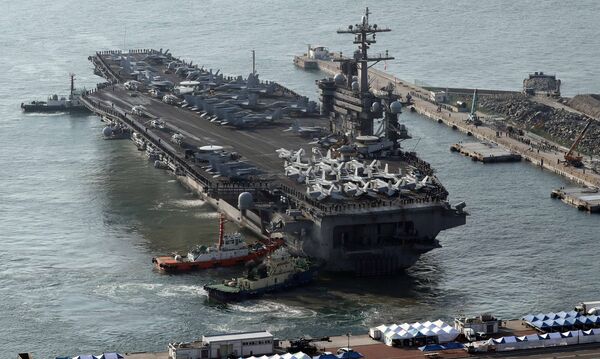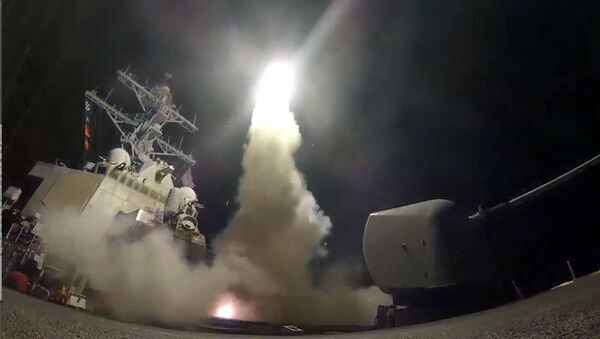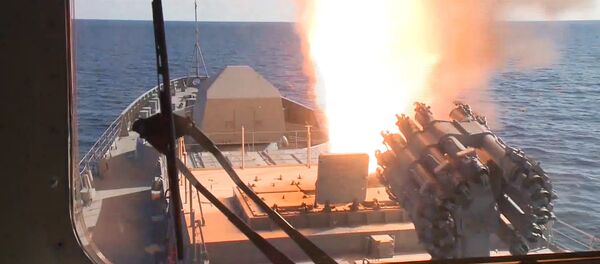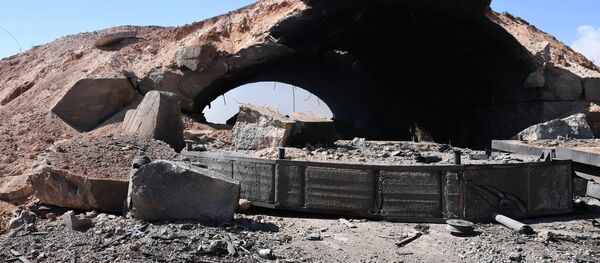In the wake of the US missile strike on Shayrat Air Base in Syria, questions arise as to what countries will be the next to be hit by US Tomahawks.
"The US shift toward an openly assertive foreign policy is obvious for both Europe and Asia. The stock of Tomahawks is large enough (about 5 thousand missiles), and this weapon was not intended for permanent storage in arsenals," Russian political analyst and commentator Alexander Khrolenko wrote for RIA Novosti.
For his part, German Foreign Minister Sigmar Gabriel called upon the international community to bring all parties concerned to the negotiating table.
"Not everybody may like it, but without Moscow and Tehran there will be no solution to the Syrian crisis… Their exclusion, therefore, is certainly not the right choice," Gabriel said Tuesday.
Earlier the German official stated that Washington's attack on the Syrian military airfield on April 7 was "understandable."
Russia's response to the US missile attack was clear and precise.
"President [Vladimir] Putin regards the US attacks on Syria as aggression against a sovereign state in violation of the norms of international law, and under a trumped-up pretext at that," Kremlin spokesperson Peskov told reporters following the attack.
Speaking to Israeli Prime Minister Benjamin Netanyahu by phone Thursday, on the eve of the US strike, Putin stressed the unacceptability of making groundless accusations against anyone before a thorough and impartial international investigation.
Khrolenko noted that following Washington's attack Russia has suspended its memorandum of understanding on air safety over Syria with the United States. The deployment of the Admiral Grigorovich missile frigate in the Mediterranean Sea as well as the USS Carl Vinson's voyage toward the Korean Peninsula prompted speculation about a possible confrontation between "the East and the West."
"However, nobody is interested in a suicidal third world war," Khrolenko highlighted.
So, "what target are US Tomahawks likely to strike next?" the commentator asked.
"Probably, Trump will not… waste Tomahawks on Syria in the near future. To strengthen the authority and influence of the United States in different parts of the world, it is more expedient to use force, for example, in the Asia-Pacific region, where Washington has acute contradictions with Beijing and the Democratic People's Republic of Korea, given the latter's growing nuclear ambitions. On the other hand, [US Defense Secretary James Mattis stressed that] 'the US-Japan alliance is the cornerstone' for peace and stability in the Asia Pacific region," Khrolenko wrote.

The commentator assumed that the US may hit the military facilities of North Korea in a show of force during Secretary of State Rex Tillerson's visit to Russia. He referred to the fact that Donald Trump had authorized the US strike on the Shayrat airfield while hosting Chinese President Xi Jinping.
Khrolenko noted that it appears that the US may adopt a "stick-and-no carrots" approach to Russia and Iran. He referred to the remark of US Ambassador to the United Nations Nikki Haley that nothing "is off the table" when it comes to exerting tougher sanctions on Moscow and Tehran.
Interestingly enough, the Trump administration's recent moves contradict the US President's election promises to stop racing to topple foreign regimes and getting involved in foreign wars.
"Many have already noticed how President Trump is changing and his agenda being influenced by Capitol Hill and sacrificing the key principles of his election program — for the sake of preserving power," Khrolenko noted.
However, it seems that not all Americans are happy about these changes.
Former US Marine Angelo John Gage, who served in Iraq, warned Donald Trump against getting bogged down in yet another military conflict.
Disclaimer: Strong language is being used in this video.
Veterans and alt-right turn against @RealDonaldTrump over suggestions of U.S. military action on Syria. An example: pic.twitter.com/mhqGfyJRWm
— WikiLeaks (@wikileaks) 6 апреля 2017 г.
President Trump is losing his electoral base, Daniel McCarthy, editor at large of The American Conservative, noted in his recent op-ed for The National Interest.
"The president has lost his base, or is in grave danger of doing so. But he has also picked up new support: from John McCain, Lindsey Graham, and Bill Kristol, all of whom praised the airstrike on Syria. Neoconservatism is suddenly back in fashion at the White House, or so it seems," McCarthy said.




